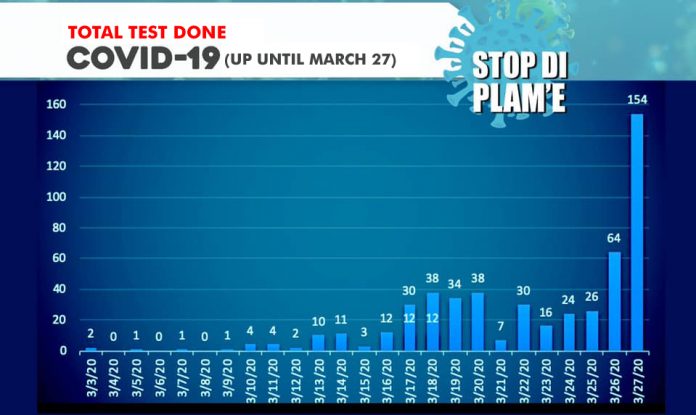The world turned upside down because of the pandemic that we are facing. Remember January and February when we were feeling sorry for China and the crisis they were/are facing with regards to corona virus? Who would ever thought that weeks after we would be in the same situation. Aruba now has 46 infected with the virus and 561 persons have been tested so far. One person is in the hospital and so far luckily no deaths. (updated March 29).
Aruba has increased the number of tests to identify more cases earlier on. The image shows the progression of number of tests done. Aruba is leading in the region with regards to number of tests performed.
From midnight last Saturday on, Aruba is put under “shelter in place” meaning that one cannot leave their home. The exception to this rule are visits to the supermarket, doctor, pharmacy and take away but it is required to remain at least two meters apart. It is prohibited to go out with more than three people together. If you have a vital service job you will still be able to get to work. The curfew between 9pm and 6am remains in place. No one can be outside their home/property except for a very few exemptions. The fines for violating the curfew and shelter in place range from 1.000 Florin to 10.000 Florin.
All companies will be closed except for gas stations, supermarkets, pharmacies, take away places, hospital. Media is allowed to perform their job. There are no visits allowed no more at the hospital. All establishments that are on the non-essential list published by the government need to close for the public during this 2-week period. Employees of these establishment are not allowed to go to work, except for very few essential requirements, such as security and payroll manager. It is recommended that these individuals have a company ID or employer letter identifying their position). Police can shut down businesses completely if curfew is violated.
From yesterday on a total lockdown is applicable. No one is allowed to enter the country, not even residents.
The world
There are 707.738 coronavirus cases throughout the world and 33.526 deaths so far. 150.732 people infected have been recovered. The coronavirus COVID-19 is affecting 199 countries and territories around the world and 2 international conveyances: the Diamond Princess cruise ship harbored in Yokohama, Japan, and the Holland America’s MS Zaandam cruise ship.
The World Health Organization (WHO) advises to stay aware of the latest information on the COVID-19 outbreak through their website and through your national and local public health authority. Many countries around the world have seen cases of COVID-19 and several have seen outbreaks. Authorities in China and some other countries have succeeded in slowing or stopping their outbreaks. However, the situation is unpredictable so check regularly for the latest news.
WHO informs how you can reduce your chances of being infected or spreading COVID-19 by taking some simple precautions:
- Regularly and thoroughly clean your hands with an alcohol-based hand rub or wash them with soap and water.
Why? Washing your hands with soap and water or using alcohol-based hand rub kills viruses that may be on your hands. - Maintain at least 1 metre (3 feet) distance between yourself and anyone who is coughing or sneezing.
Why? When someone coughs or sneezes they spray small liquid droplets from their nose or mouth which may contain virus. If you are too close, you can breathe in the droplets, including the COVID-19 virus if the person coughing has the disease. - Avoid touching eyes, nose and mouth.
Why? Hands touch many surfaces and can pick up viruses. Once contaminated, hands can transfer the virus to your eyes, nose or mouth. From there, the virus can enter your body and can make you sick. - Make sure you, and the people around you, follow good respiratory hygiene. This means covering your mouth and nose with your bent elbow or tissue when you cough or sneeze. Then dispose of the used tissue immediately.
Why? Droplets spread virus. By following good respiratory hygiene you protect the people around you from viruses such as cold, flu and COVID-19. - Stay home if you feel unwell. If you have a fever, cough and difficulty breathing, seek medical attention and call in advance. Follow the directions of your local health authority.
Why? National and local authorities will have the most up to date information on the situation in your area. Calling in advance will allow your health care provider to quickly direct you to the right health facility. This will also protect you and help prevent spread of viruses and other infections. - Keep up to date on the latest COVID-19 hotspots (cities or local areas where COVID-19 is spreading widely). If possible, avoid traveling to places – especially if you are an older person or have diabetes, heart or lung disease.
Why? You have a higher chance of catching COVID-19 in one of these areas.




















